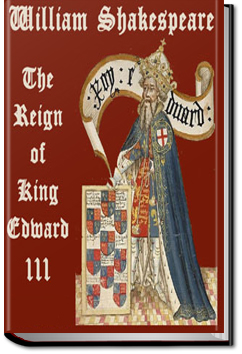

KING EDWARD.
As wise, as fair; what fond fit can be heard,
When wisdom keeps the gate as beauty's guard?—
It shall attend, while I attend on thee:
Come on, my Lords; here will I host to night.
[Exeunt.]
[Enter Lodowick.]
LODOWICK.
I might perceive his eye in her eye lost,
His ear to drink her sweet tongue's utterance,
And changing passion, like inconstant clouds
That rack upon the carriage of the winds,
Increase and die in his disturbed cheeks.
Lo, when she blushed, even then did he look pale,
As if her cheeks by some enchanted power
Attracted had the cherry blood from his:
Anon, with reverent fear when she grew pale,
His cheeks put on their scarlet ornaments;
But no more like her oriental red,
Than Brick to Coral or live things to dead.
Why did he then thus counterfeit her looks?
If she did blush, twas tender modest shame,
Being in the sacred presence of a King;
If he did blush, twas red immodest shame,
To veil his eyes amiss, being a king;
If she looked pale, twas silly woman's fear,
To bear her self in presence of a king;
If he looked pale, it was with guilty fear,
To dote amiss, being a mighty king.
Then, Scottish wars, farewell; I fear twill prove
A lingering English siege of peevish love.
Here comes his hig
Get ALL YOU CAN BOOKS absolutely FREE for 30 days. Download our FREE app and enjoy unlimited downloads of our entire library with no restrictions.
Have immediate access and unlimited downloads to over 200,000 books, courses, podcasts, and more with no restrictions.
Everything you download during your trial is yours to keep and enjoy for free, even if you cancel during the trial. Cancel Anytime. No risk. No obligations.
For just $24.99 per month, you can continue to have unlimited access to our entire library. To put that into perspective, most other services charge the same amount for just one book!

As avid readers, we understand the joy of immersing ourselves in a captivating story or getting lost in the pages of a good book. That's why we founded All You Can Books back in 2010, to create a platform where people can access an extensive library of quality content and discover new favorites.
Since our founding days, we’ve continuously added to our vast library and currently have over 200,000 titles, including ebooks, audiobooks, language learning courses, podcasts, bestseller summaries, travel books, and more! Our goal at All You Can Books is to ensure we have something for everyone.
Join our community of book lovers and explore the world of literature and beyond!
(Lit Life Patreon SIAY 2023-2024)